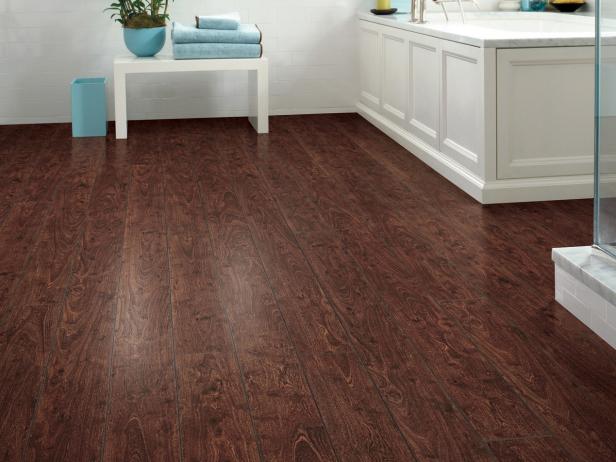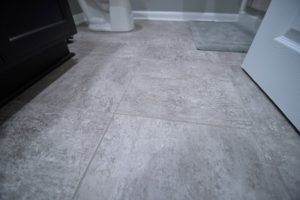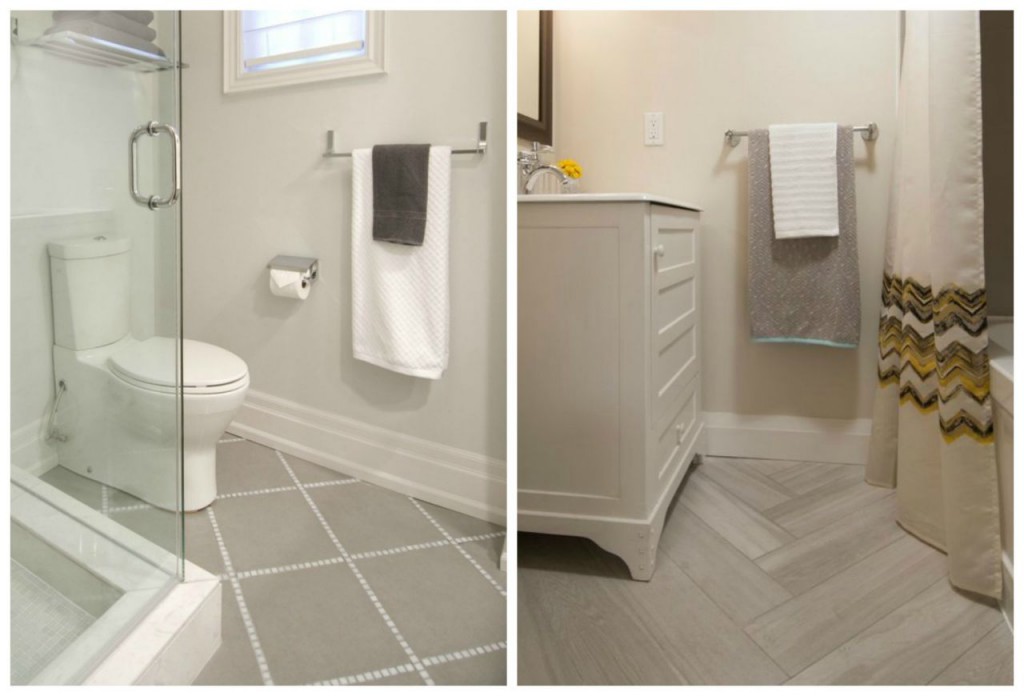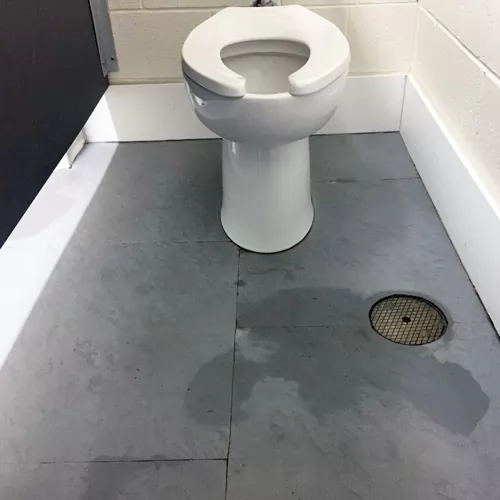As I embarked on the journey of renovating my basement and transforming it into a functional and inviting space, one crucial aspect I couldn’t overlook was the choice of flooring for the basement bathroom. The unique environment of a basement bathroom, with its potential for moisture and humidity, requires careful consideration when selecting the right flooring option. After extensive research and consulting with experts, I discovered five fantastic basement bathroom flooring options that offer both style and practicality, ensuring a beautiful and durable bathroom that will stand the test of time.
Ceramic or Porcelain Tiles
Ceramic and porcelain tiles emerged as a top contenders for my basement bathroom flooring due to their unmatched durability and water-resistant properties. These tiles are highly resistant to moisture and humidity, making them an ideal choice for an environment prone to dampness. Additionally, they come in a plethora of colors, patterns, and textures, allowing for versatile design possibilities.
To enhance slip resistance and ensure safety, I opted for tiles with a textured or matte finish. This provided a reliable grip, even when the floor is wet, eliminating concerns about potential accidents. The low-maintenance nature of ceramic and porcelain tiles was an added bonus, requiring only simple cleaning to keep them looking pristine and fresh.
Luxury Vinyl Planks (LVP)
Luxury vinyl planks (LVP) caught my attention as a cost-effective and visually appealing basement bathroom flooring option. LVP offers an excellent combination of style, water resistance, and comfort underfoot. With advancements in technology, these vinyl planks can realistically mimic the appearance of natural materials, such as hardwood or stone, without the associated costs and maintenance.
I appreciated the ease of installation with LVP, as many options come with a simple click-lock system that allowed for a hassle-free DIY installation. The ability to create cohesive design themes by using the same LVP flooring throughout the basement was another appealing factor. Additionally, LVP’s ability to withstand water spills and humidity made it an ideal choice for a basement bathroom that is both functional and visually appealing.
Concrete with Sealant
For a more industrial and contemporary look, I considered the option of leaving the basement bathroom floor as raw concrete. Treated with a high-quality sealant, concrete floors become remarkably resistant to moisture and stains, making them suitable for a basement bathroom environment.
The minimalist charm of concrete appealed to my design sensibilities, as it offered a unique and unconventional flooring option. With the right sealant, the concrete floor is easy to clean and maintain, making it a low-maintenance choice for a busy household. By pairing the concrete floor with cozy area rugs or decorative elements, I was able to create a modern and inviting bathroom space that stands out with its understated elegance.
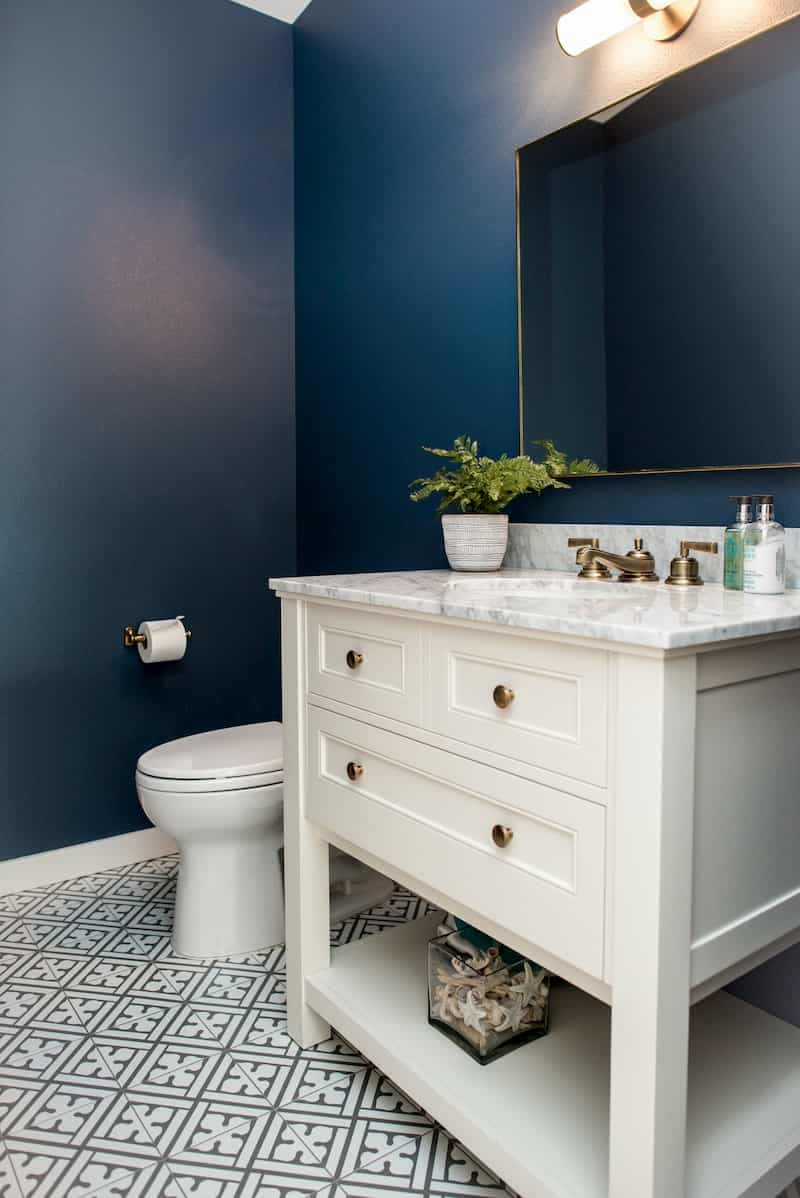
Engineered Hardwood
To infuse a touch of warmth and sophistication into my basement bathroom, I explored the option of engineered hardwood. Unlike solid hardwood, engineered hardwood is crafted with multiple layers of wood, which enhances its stability and resistance to moisture. This makes it suitable for basement environments where humidity levels can fluctuate.
I found a wide range of engineered hardwood options, each offering various wood species, colors, and finishes. This allowed me to choose a style that harmonized with the rest of the basement’s design. With proper care and maintenance, engineered hardwood proved to be a durable and visually stunning choice for my basement bathroom flooring.
Natural Stone Tiles
The allure of natural stone tiles, such as travertine, marble, or slate, drew me in with their captivating beauty and timeless appeal. While slightly more expensive than other options, the luxurious and sophisticated look of natural stone made it a tempting choice for my basement bathroom.
Selecting a slip-resistant finish for the stone tiles provided peace of mind, knowing that the floor would remain safe even in damp conditions. The unique variations and patterns inherent in natural stone added a touch of opulence and individuality to my basement bathroom, elevating it to a spa-like retreat. With proper sealing and regular maintenance, the natural stone tiles offered exceptional durability, making them a worthwhile investment for a luxurious and enduring basement bathroom.
The process of choosing the right basement bathroom flooring option involved careful consideration of factors such as water resistance, durability, style, and maintenance requirements. Each option presented unique benefits, allowing me to select a flooring solution that best suited my design preferences and practical needs. Whether I opted for ceramic tiles’ water resistance, LVP’s affordability, concrete’s industrial charm, engineered hardwood’s warmth, or natural stone’s luxurious appeal, each flooring option played a crucial role in transforming my basement bathroom into a functional and visually stunning space that I now enjoy with pride.
What is the Best Flooring for Basements? (Get the Pros and Cons)
What is the Best Flooring for Basements? (Get the Pros and Cons)
20 Sophistiqué sous-sol salle de Bains Idées pour Embellir le
Bathroom Flooring Pros and Cons
47 Cool Finished Basement Ideas (Design Pictures) Basement
Bathroom Flooring Ideas: Cushioned Flooring
Related Posts:
- New Concrete Basement Floor
- Basement Floor Sinking
- Basement Floor Insulation Methods
- Concrete Flooring Options For Basement
- Sill Gasket For Basement Floor
- Vinyl Flooring In Basement Pros And Cons
- How Thick Are Basement Floors
- Thermal Break Basement Floor
- Interlocking Rubber Floor Tiles For Basement
- Remove Water From Basement Floor
Basement Bathroom Flooring Options
Basements are a great way to add extra living space to a home, and adding a bathroom to the basement can be a great way to increase the value of the house. But when it comes to choosing the right flooring for your basement bathroom, there are a few things to consider. In this article, we’ll explore some of the most popular basement bathroom flooring options and discuss their pros and cons.
Laminate Flooring
Laminate flooring has become increasingly popular in recent years, thanks to its affordability and ease of installation. Laminate flooring is available in a variety of colors and styles, so you should be able to find one that suits your taste. It is also relatively easy to clean and maintain, making it a great option for busy households. However, laminate flooring can be prone to scratches and dents if it isn’t installed properly, so it’s important to make sure you hire an experienced installer.
Vinyl Flooring
Vinyl flooring is another popular option for basement bathrooms. It is available in a wide range of colors and patterns, so you should be able to find something that fits your style. Vinyl is also very durable, making it an ideal choice for high-traffic areas such as bathrooms. However, vinyl can be difficult to install and may require professional help. It may also need to be sealed periodically in order to prevent water damage.
Tile Flooring
Tile flooring is another popular choice for basement bathrooms. Tile is available in a variety of colors, sizes, and shapes, so you should be able to find something that suits your taste. It is also very durable and easy to clean, making it a great option for busy households. However, tile can be expensive and may require professional installation in order to get it right.
Cork Flooring
Cork flooring is a great choice for basement bathrooms due to its softness and sound absorption properties. Cork is also resistant to water damage, making it an ideal option for wet areas such as bathrooms. However, cork can be difficult to install and may require professional help in order to get it right.
Concrete Flooring
Concrete flooring is becoming increasingly popular for basement bathrooms due to its durability and low maintenance requirements. Concrete is also relatively inexpensive compared to other options, making it an attractive option for budget-minded homeowners. However, concrete can be difficult to install and may require professional help if you want it done correctly.
FAQs About Basement Bathroom Flooring Options
Q: What is the most affordable basement bathroom flooring option?
A: The most affordable basement bathroom flooring option is likely laminate flooring or vinyl flooring. Both options are relatively inexpensive compared to other options such as tile or cork flooring.
Q: What is the most durable basement bathroom flooring option?
A: The most durable basement bathroom flooring option is probably tile or concrete flooring. Both options are extremely durable and resistant to water damage, making them ideal choices for wet areas such as bathrooms.
Q: Is it possible to install basement bathroom flooring myself?
A: It is possible to install some types of basement bathroom flooring yourself, such as laminate or vinyl flooring. However, more complex installations such as tile or concrete flooring will likely require professional help in order to get them done correctly.
Q: What type of flooring should I avoid in my basement bathroom?
A: You should avoid carpet in your basement bathroom due to its tendency to absorb moisture and become moldy over time. Additionally, wood floors should also be avoided due to their susceptibility to water damage.
Conclusion
When choosing the right basement bathroom flooring option for your home, there are many factors to consider including cost, durability, maintenance requirements, and installation difficulty. The most popular options include laminate, vinyl, tile, cork, and concrete flooring; each one has its own pros and cons that you should consider before making
